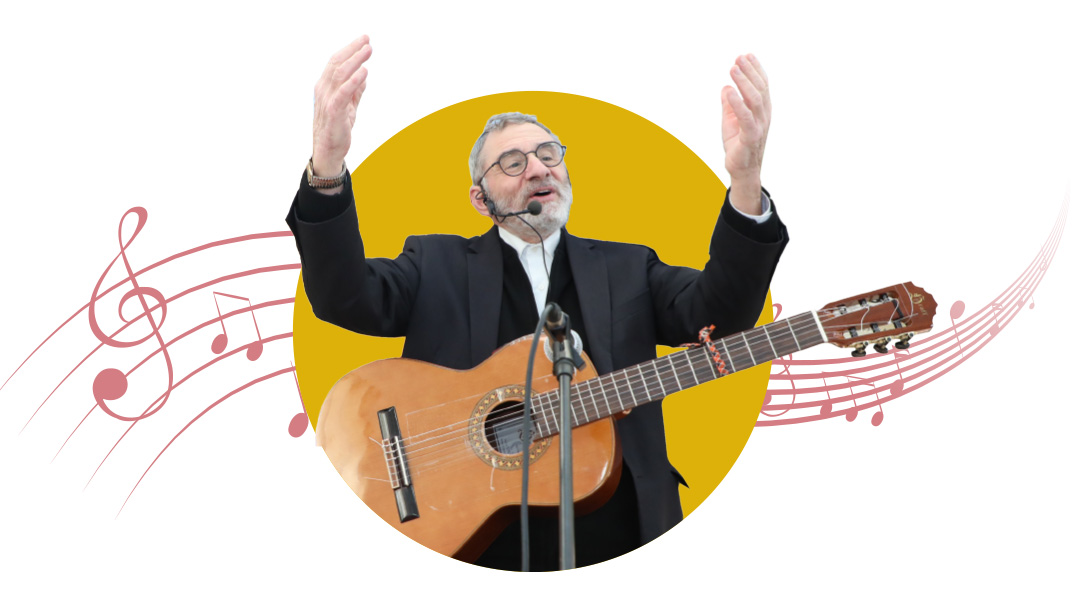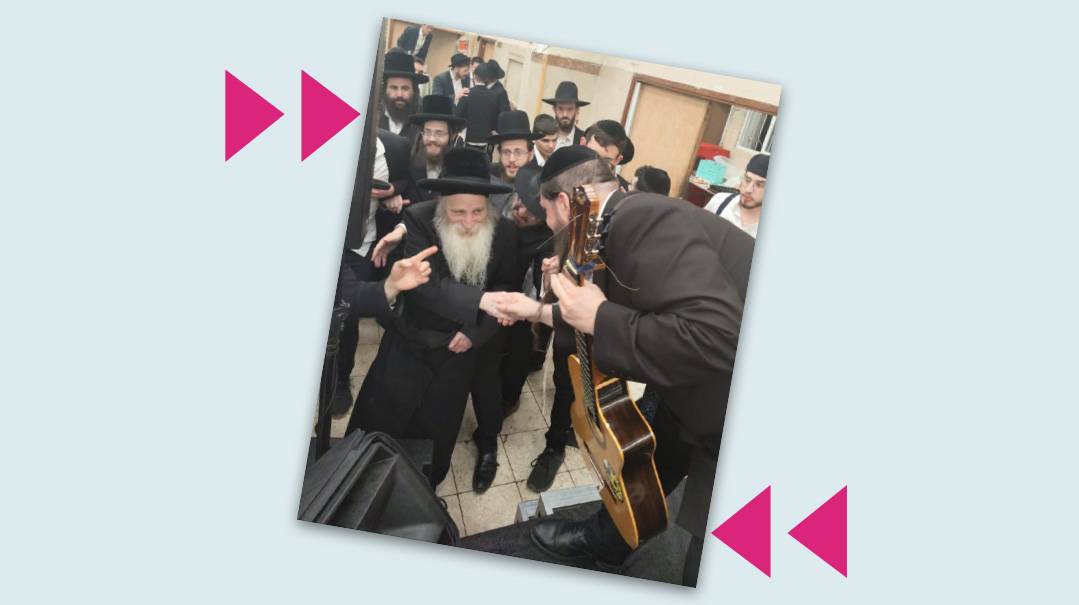A Piece of Our Childhood
| February 6, 2024In tribute to Rabbi Alter Yachnes, who created the soundtrack of Yiddishkeit for children around the world

The petirah of Rabbi Alter Yachnes in Jerusalem last Shabbos closes an era for children (and adults who used to be children) all over the world. He was known for decades as Rebbi Alter, creator of educational children’s music albums full of happy, Yiddishkeit-infused songs, a cheder rebbi with a knack for connection who had a Pied-Piper kind of touch with young children. While he made a slow migration from the classroom to the recording studio and devoted much time to singing with both children and elderly people, he remained in that rebbi role all his life.
Rabbi Alter Tzvi Aryeh Yachnes grew up in Flatbush in a rabbinic family affiliated with the Yeshiva Chofetz Chaim family, and Alter carried forth his family’s warmth and simchah combined with the Yeshiva Chofetz Chaim sense of mission to spread Torah.
In producing his albums of wholesome, pure messages and a contagious kind of joy, he rose willingly to the higher standards of chinuch in Eretz Yisrael, where chareidi children are often very sheltered.
“In America, the kids’ albums are often about making Yiddishkeit fun, which is great where that is needed,” explains Rabbi Suki Berry, a longtime mechanech in his own right and a veteran musician and producer. “But in Eretz Yisrael, there is an aversion to ‘fun.’ Simchahdig, happy Yiddishkeit is fine, but fun isn’t. Rebbe Alter was aware of the higher bar and committed to it, not just because it was the smart thing to do, but because he respected it.”
And that’s how he won the trust of parents and educators. Born-and-bred Israelis joined American listeners and loved the spark of chiyus and simchah, but they knew they could rely on Rebbi Alter not to breach their walls, both musically and in his content.
While Suki Berry has worked with dozens of singers who are his friends, he says his friend Rebbi Alter was different — not a singer but a rebbi. He came to the studio with all his material, sometimes with four or five different options for concepts or stories. “He counted on me and I enhanced the musical ideas, but the content was his. I was the tailor sewing the garment, but he was the rebbi who wore it.”
Rabbi Yachnes started out by teaching in Jerusalem’s Talmud Torah Hamesorah, and soon realized that songs are a magnetic teaching tool: Not only did the children learn quickly and pleasantly, but they also retained the content. He first created songs in order for the students to remember information, such as the names of the parshiyos, the shivas haminim, the names of the shevatim and the months, and soon the boys’ parents were asking him to send recordings home so they could keep up.
“I would sit down with eight tape recorders, count to three, push eight buttons, and then sing the songs we sang in class, accompanying myself on guitar,” Rabbi Yachnes told Mishpacha in an interview last year. “But at some point, it dawned on me that there was a simpler way. I played and sang into just one cassette and took it to the Gal-Paz music store on Rechov Malchei Yisrael, asking Chaim Zilber a”h, the owner, to make me a dozen copies on his dubbing machine. He was curious about what the tape was, and when I told him, he said, ‘Let’s do something professional in the studio.’ Jeff Horvitz ran the studio and arranged the music, and Pirchei Purim in Hebrew was the first album, in 1985.”
When it was well received, Zilber asked Rebbi Alter to work on more material. On one of his frequent visits to the flagship Gal Paz store on Malchei Yisrael, he ran into Suki Berry, an old acquaintance from Flatbush. It wasn’t long before a partnership was formed, in which Suki produced a Pesach album, then a Chanukah tape, then tapes for Succos, Shabbos, Rosh Hashanah, and Ring Around the Year Rebbi Alter albums, in both Hebrew and in English.
The tunes were all familiar, but the lyrics had incredible freshness. Among the enduring hits were “Aish is Fire, Fire is Hot…” to the tune of “Sevivon, Sov, Sov, Sov,” “Mashiv Haruach Umorid Hagashem,” which became an iconic expression of delight at rain in Eretz Yisrael, and Yom Tov specials such as “A chicken round my head I’ll swing,” “In the month of Elul we blow the shofar,” and of course the classic “Pharaoh in Pajamas.”
While working on that first album, Suki, who was learning in a kollel nearby Talmud Torah Hamesorah where Rebbi Alter taught, would sometimes drop in to work with Rebbi Alter during his afternoon break. He was mystified as to why his friend, an expert alef-beis rebbi who was working on preparation for the next day’s teaching in his empty classroom, could be found sitting in a different seat every day. Eventually, he asked.
Rebbi Alter explained that each day, he chose a different child’s seat to sit in while preparing, in order to focus on that child’s life. While looking at the blackboard from that child’s angle, envisioning the classmates who sat around him, and the home circumstances he came from, he was able to connect and relate to that individual student.
He used the summers for writing new songs, often traveling to Netanya’s separate beach to de-stress from the school year. “I often found myself sitting by the sea in Kiryat Sanz, relaxing with my pen and notebook,” he told Mishpacha. “At times it was just me and the lifeguard.”
Perhaps because the music came from his warm heart, Rebbi Alter succeeded in creating positive childhood memories for so many. Solemnly aware of the responsibility of maintaining mesorah, he gave the gift of simchah — nurtured by his own parents and upbringing — to a wide audience of two generations and counting. If he was unsure about the lyrical packaging of messages or content, he would ask a sh’eilah about how topics should be presented for children.
A Jerusalem singer related that he was recently called to Kiryat Sefer to bring a little simchah to a man in his thirties tragically struck with dementia. He and a few musicians sang and played many songs, while the patient just stared blankly — no response, not a word, no smile or light of recognition. Then they decided to sing a few Rebbi Alter classics. The patient still didn’t speak, but he began to sing along. The child within, whole and trusting, was still there underneath, and “Pharaoh in Pajamas” and “Mashiv Haruach” spoke to him.
At the levayah, two speakers mentioned the song “Pharaoh in Pajamas.” Rebbi Alter succeeded in making fun of Pharaoh and bringing him to life for the children, while avoiding leitzanus.
Rabbi Yachnes admitted to Mishpacha one of his own regrets, though. “On ‘Ring Around the Year,’ the Shavuos song is about bringing bikkurim. To this day, I regret it, because I feel that I should really have done a song about kabbalas HaTorah,” he said. “I’m hoping that I’ll still get a chance to correct this by putting out another version.” Sadly, his illness made that dream impossible, but for tens of thousands of children, the joy of Shabbos and Yamim Tovim was anticipated and stoked by his happy voice and genuine excitement, bringing more warmth and depth to their individual kabbalas HaTorah.
Rabbi Suki Berry believes that Rebbi Alter’s songs will pass the test of time and endure. “Happy niggunim that are more popular today than ever, his music speaks to the heart and has a place among the enduring classics.”
Yehi zichro baruch.
(Originally featured in Mishpacha, Issue 998)
Oops! We could not locate your form.






